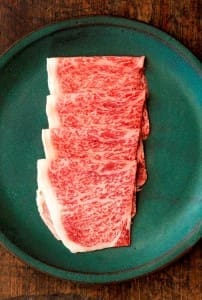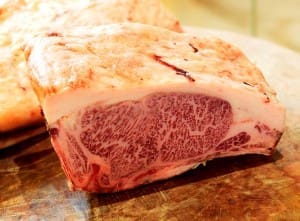SAY it slowly: Four hundred and fifty dollars a kilo.
It sounds more like the price a customer would pay for some rare, precious metal, but in fact it is the retail asking price for what Beef Central believes may be the most expensive meat protein ever sold in Australia.
Sydney retail butcher Victor Churchill’s is widely regarded as the most exclusive meat purveyor in the country. Later this week it will offer customers what it claims is the best beef ever raised in Australia – a Fullblood Wagyu carcase carrying elite bloodlines, an abundance of finely textured marbling and unusually large eye muscle area.
It’s that rare combination of marbling characteristics (BMS score 9+, the highest the assessment can go using Australia’s Ausmeat language) and carcase size, as indicated by eye muscle area which sets this offer apart.
Victor Churchill’s (see Beef Central’s earlier profile “Is this the world’s best butcher’s shop?”) regularly offers Japanese Fullblood Wagyu beef from David Blackmore’s Blackmore Wagyu enterprise in Victoria, but this particular carcase the company regards as ‘possibly unique, recognised as the best Wagyu beef ever produced in Australia.’
It’s regular A5-equivalent grade (Japan’s highest rating, for marbling and yield) Blackmore Wagyu retails in the store for $169.99 /kg (Côte de bœuf) and $179.99 for rib eyes. Occasionally, tenderloins will push out to $250/kg. Much the same prices are being charged by another super-premium Sydney butcher carrying elite Fullblood Wagyu, Peter Bouchier.
But as small in volume as this week’s special offer may be, Churchill’s is now taking retail pricing for beef to another, altogether different level.
While Victor Churchill’s Anthony Puharich wasn’t able to speak to Beef Central due to commitments overseas this week, his supplier, David Blackmore said he wouldn’t be surprised if the special offer “quickly sold out.”
“I’ve got no doubt that there will be well-heeled Sydney ‘foodie’ customers that will line up to get a piece of the most expensive beef ever sold in Australia,” he said.
Mr Blackmore, regarded as one of Australia’s elite Wagyu producers, agreed with Beef Central’s assessment that it was probably the most expensive beef ever seen at retail in this country.
“It’s great publicity for Victor Churchill’s, the Wagyu industry, and the beef industry generally,” he said.
“It’s a very, very good carcase – amongst the best we have produced, especially for evenness of marbling distribution throughout the muscle.”
The featured animal spent 650 days on Mr Blackmore’s property in Alexandra, Victoria. David Blackmore’s unique ‘Eco-Feeding’ concept, combining access to conventional Japanese longfed rations in a grass paddock environment, rather than a conventional feedlot setting, is discussed in this earlier Beef Central article.
“Beef from this animal, Aizakura H178, has set a new quality benchmark for beef,” Victor Churchill told its regular customers via a notification this week.
“The carcase has achieved Australia’s highest meat and fat colour grades, carries a marbling score (sometimes incorrectly described as marble score) of 9+ and possesses a rib eye area 13sq cm larger than what is considered exceptional in the meat world.”
“As well as exclusive genetics, the steer was raised on a natural diet containing no antibiotics, GM foods or growth hormone promotants. The resulting beef has a tender, buttery taste with a soft texture and best eaten as thinly sliced carpaccio or as the best steak you’re ever likely to eat,” Victor Churchill’s principal Anthony Puharich said.
He described the carcase as “simply the best quality Wagyu beef Australia has ever produced. We will be talking about the Aizakura Wagyu bloodline for years to come.”
“As Aizakura H178 takes its place as Australia’s best beef carcase ever reared and raised, it will also be its most expensive. The Wagyu will be sold through Victor Churchill for $450 a kilo. Wagyu beef of this quality is rarely seen and there is limited availability,” Mr Puharich told regular customers.
“This is a phenomenal product: luxury in its purest form. I am proud to be able to offer such a once-in-a-lifetime tasting experience.”
Genetics plays a big part
For those students of Japanese Wagyu breeding among you, the feature carcase being sold this week at Churchill’s carries some elite and rarely seen (outside of Japan) Blackmore Fullblood Wagyu genetics.
“From David Blackmore’s award winning Wagyu herd comes Aizakura H178,” Churchill’s note to customers said. “Aizakura is a much prized cow family whose origins can be traced back to Japan’s most famous cow – Kikutsuru from the Hyogo Prefecture, home of Kobe Beef,” it said.
David Blackmore said the dam, foundation cow Aizakura U100, was still on the Blackmore farm, and still productive at 16 years of age. She has more than 3000 descendants born on the Blackmore farm – about half through her elite performing sons, and the balance through daughters, either via embryo transfer or AI.
Aizakura U100 is by the only son of Taniufuku Doi to come to Australia.
“Taniufuku Doi, a Takeda Farms bull, features in the bloodlines of perhaps half of the Wagyu cattle involved in AI in Japan,” Mr Blackmore said. “There’s not very much around, as there were issues with the viability of his semen,” he said.
For this reasons Taniufuku Doi remains only very lightly represented in Australian genetics.
“Everybody is looking for the next generation of Wagyu sires in Australia,” Mr Blackmore said.
The holy grail is the combination of high-performing, consistent marbling together with carcase size, because the best marbling performers tend to be the smaller Tajima bloodline cattle.
Blackmore claims to have the only known 100pc Tajima bloodline cow family in Australia, known as the Kinu cow family. The sire which produced the elite carcase being sold this week in Churchill’s is Kinzuru E006, out of a Kinu cow family dam, but sired by a half Tajima sire, Itozuru Doi RF151.
The key point is that in the Blackmore herd, RF151 is producing carcase quality and consistency of quality equal to the legendary Michifuku, but his progeny’s carcases are significantly heavier than Michifuku’s – averaging more than 50kg carcase weight heavier, and therefore now regarded as the most profitable bull Blackmore has ever used. Carcases from some progeny have weighed more than 600kg, with massive eye muscle areas.
“Blackmore now exports Fullblood Wagyu beef to more than 20 countries,” Mr Blackmore said.
“In probably three quarters of those markets, we are competing directly with Japanese-produced Wagyu beef. But the one area where the Japanese industry has made big progress, while Australian Wagyu has not, is eye muscle size. We are significantly smaller in eye muscle size, and it is becoming a competitive disadvantage,” he said.
“The Japanese have been putting selection pressure on Wagyu for the combination of eye muscle size and marbling, and we have to be out there looking for the next generation of sires that can do the same, because there is no further opportunity to simply import latest Japanese genetics.”
Illustrating how elusive carcase quality performance can be, Michifuku – still widely known as the best carcase bull to come out of Japan – is in fact 30-year old genetics.
“We’re really sitting in a time-warp, in the fact the industry is still using this 30-year-old genetics,” Mr Blackmore said.
Blackmores is now starting to receive results from its own genomics project, aiming to discover genes and combinations of genes within Wagyu DNA which contribute to desirable traits. More on that project, being conducted in association with the Victorian Government and the University of Melbourne -which is conducting similar genomics research on behalf of the dairy industry – in coming months.
- Cuts from the prized carcase will be available in Victor Churchill’s Woollahra (Sydney) retail outlet from tomorrow, 18 March, in strictly limited supplies. Pre-orders with Churchill’s head butcher Darren are advised, click here for more information.
- David Blackmore will discuss his ‘Eco-feeding’ concept during a panel session at the upcoming 2015 World Wagyu Conference in Yeppoon, on 8-10 May.


